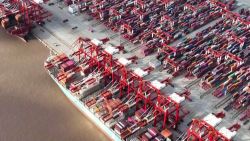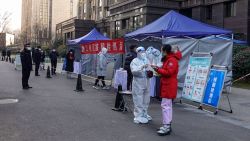Asian markets dipped Wednesday after the United States reported particularly dour manufacturing data — a potentially troubling sign for the global economy.
Japan’s Nikkei (N225) closed down 0.5%, while South Korea’s Kospi (KOSPI) sank 2%.
Hong Kong’s Hang Seng (HSI) dropped 0.2% following an intense day of protests in the Asian financial hub. The market was closed Tuesday to mark the 70th anniversary of the founding of the People’s Republic of China, and protesters clashed with police and residents across multiple districts.
“I watch these events with a growing sense of despair,” wrote Robert Carnell, chief economist and head of research for Asia Pacific at ING, in a Wednesday research note. “My personal sense is that there is as big an economic issue underlying these protests as there is a political one.”
Hong Kong also reported dismal retail sales figures after market close. Total retail sales volume in August fell by more than 25%, accounting for price changes, compared to a year earlier.
The year-on-year decline is the steepest for a single month on record, according to a government spokesperson. The plunge reflected “severe disruptions” to tourism and consumer activity caused by the protests.
China’s Shanghai Composite Index (SHCOMP), meanwhile, remains closed for the holidays.
Wednesday’s losses followed a bad day for stocks in the United States. The Dow (INDU) fell nearly 350 points Tuesday after a key economic report showed that American factory activity was surprisingly weak last month.
The ISM manufacturing index dropped to its lowest level since June 2009, the last month of the recession. Manufacturers cited the US-China trade war as weighing on demand and making materials more expensive, according to the ISM. The data “is only fanning long-standing fears of slowing global growth,” said Alec Young, managing director of global markets research at FTSE Russell.
“The waves of the trade war appear to be washing up on United States’ shores,” Jeffrey Halley, senior market analyst for Asia Pacific at Oanda, wrote in a research note Wednesday.
Halley noted, though, that manufacturing data elsewhere hasn’t been as rocky, including in emerging Asian markets.
“If they are doing so in such a toxic global trade environment, then imagine how they may perform if we get a trade breakthrough in the coming weeks,” Halley wrote. “It’s not all doom and gloom.”
It’s also too soon to say that the United States “is about to wither on the vine,” he added.
Even so, the global economy isn’t totally out of the woods just yet. Analysts at Capital Economics said Tuesday that although recent manufacturing data out of China was encouraging — lifting the global manufacturing PMI -— that progress likely won’t be sustained.
“While it is still too early to call time on the downturn in global industry, it is at least of some comfort that the pace of the slowdown appears to be easing,” they wrote in a research note.
Other economists at ING also noted that “with greater reliance on exports, Asia remains in the front to face the brunt of the global downturn.”




















